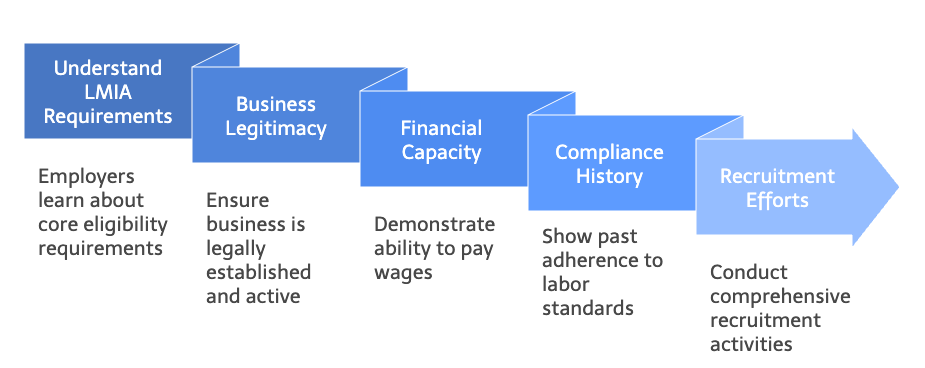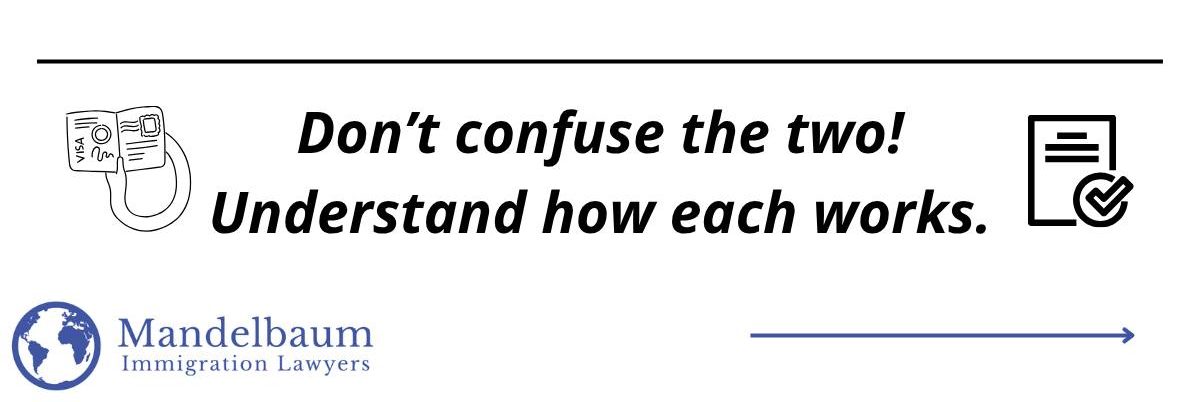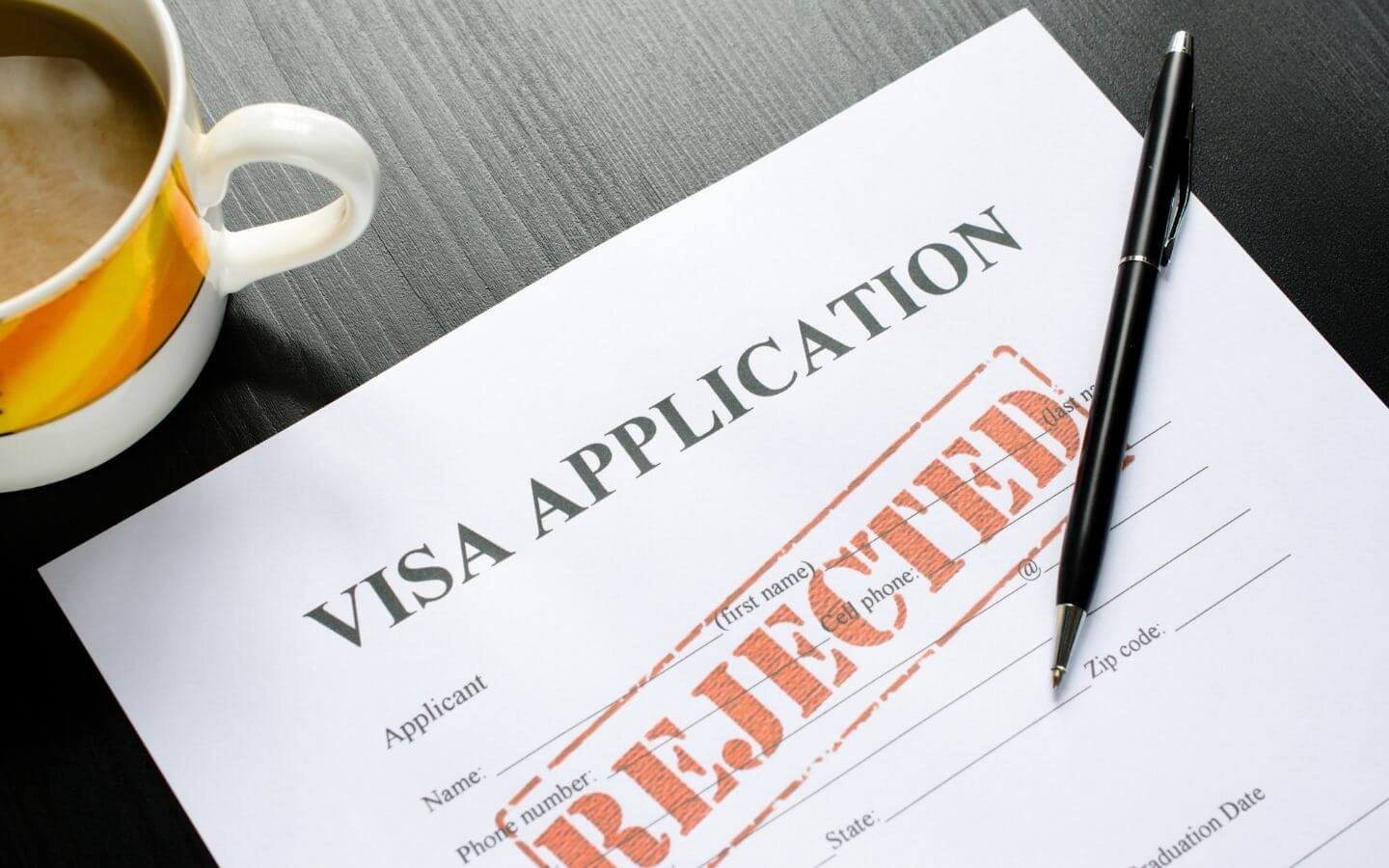The Temporary Foreign Worker Program requires extensive documentation to prove business legitimacy, financial capacity, and compliance with recruitment requirements.
Understanding exactly what documents you need and how to organize them can mean the difference between approval and rejection. Missing even a single required document can result in processing delays or outright refusal of your LMIA application.
This comprehensive guide outlines all general LMIA requirements, provides detailed checklists of required documents by category, and explains stream-specific documentation needs. Whether you’re applying for a High-Wage LMIA, Low-Wage LMIA, Global Talent Stream, or Seasonal Agricultural Worker Program LMIA, this checklist will help ensure your application is complete and organized.
Canadian employers must navigate complex requirements spanning immigration law, employment law, and business regulations. Mandelbaum Immigration Law Firm specializes in helping employers successfully navigate these requirements. A single mistake in documentation can cost you months of processing time and thousands of dollars in lost opportunities.
If you’re a foreign worker whose work permit was refused after an LMIA was approved, our firm also assists with visa refusal appeals and judicial review applications.
General LMIA Requirements (All Streams)
Before examining specific document requirements, it’s important to understand what an LMIA is and how the process works. Employers must understand the four core eligibility requirements that apply to all LMIA streams. These requirements form the foundation of every LMIA application, regardless of which stream you’re pursuing.
Business Legitimacy Requirements
To qualify as a legitimate business for the purposes of applying for an LMIA, your business must be legally established in Canada and “doing business” in the sense of being engaged in the supply of ongoing and regular legal goods or services in Canada.
Some provinces also require you to register with them to hire foreign nationals through the temporary foreign worker program before you can apply for an LMIA. These registrations are usually submitted to the provincial employment or labour department or business registrations department. Procedures vary province-to-province and business-to-business. Some exceptions may apply.
Other LMIA requirements include:
- Registering or licensing your business, trade or profession with authorities regulating the conduct of your business in your province or Canada
- Registering with Workplace Safety and Insurance Board for businesses where this is a mandatory requirement, such as construction businesses
- Complying with collective agreements for unionized workplaces
You should consult with an LMIA lawyer to seek advice on whether your business meets the business legitimacy requirements of the Temporary Foreign Worker program, including the requirements specific to your business, trade or workplace in your province.
Financial Capacity Requirements
Your business must be able to demonstrate that it can pay the wages offered to the foreign national throughout the duration of the employment period. For new businesses without a long history of financial reporting and filing taxes, this can be very difficult. Similarly, businesses showing a loss or marginal profit in their profit and loss (income) statement, or negative or marginally positive retained earnings on their balance sheet, may also not meet the financial capacity requirements.
Businesses with no employees may also be prevented from accessing the temporary foreign worker program. This means that sole proprietorships or small businesses where only the owners are engaged can be rejected from obtaining an LMIA.
These barriers to new or small businesses did not always exist. Prior to the year 2024, the temporary foreign worker program had robust guidelines for assessing startups and small businesses. However, new policies and interpretations of the program rules, regulations and purposes of the program in 2024 and 2025 have largely resulted in the exclusion of many businesses that might have previously been included in the program.
As such, businesses are encouraged to explore alternative options or transitional measures for employing foreign workers, such as through LMIA-exempt work permit options.
An immigration lawyer with expertise in LMIA assessments can help you evaluate whether your business meets the financial capacity requirements to hire a foreign worker through the TFW program.
Compliance History Requirements
Businesses that are returning to the temporary foreign worker program must have a demonstrated history of having paid the wages and offered working conditions to the foreign workers they employed. They must also demonstrate that they provided a workplace environment that was free from abuse, that they communicated the rights of foreign workers to their employees and posted those rights publicly in a place where workers had regular access, and had developed procedures in place to ensure that foreign workers could confidentially report any violation of their rights or employment conditions.
Employers found non-compliant for past transgressions, or who simply failed to meet these basic policy and procedural requirements, may be prohibited from accessing the program.
Non-compliant employers are also reported on a public “blacklist” of transgressing employers, available on Service Canada’s Temporary Foreign Worker Program website. This can cause reputational damage for the employer, even if the infraction was relatively minor and inadvertent.
It is therefore important for employers to seek advice and representation from competent LMIA compliance lawyers to ensure their workplace policies and procedures, and labour and employment practices, conform to the requirements of the temporary foreign worker program.
Recruitment Efforts Requirements
Most LMIA streams require you to conduct comprehensive recruitment efforts. There are variations to the recruitment and advertising requirements depending on the stream, occupation, industry or workplace.
Low wage and high wage stream LMIA applications require all employers to engage in 4 weeks of broad based, public advertising on the position. For a detailed explanation of the entire process, see our complete LMIA application guide.
Advertisements must generally be national in scope, target Canadian citizens and permanent residents across multiple platforms and sources, and may need to target underrepresented groups. An ad must also be placed on the Job Bank website.
Throughout the advertising period, employers are required to review all applications from Canadian citizens or permanent residents. Employers must invite to an interview any job applicant who is a Canadian citizen or permanent resident and who meets the advertised LMIA requirements of the position. Employers must not discriminate on the basis of nationality or immigration status.
Employers must thoroughly document advertisements, recruitment efforts and interviews. Those records will likely be requested and reviewed by a TFW program officer.

Required Documents Checklist
The following sections outline the specific documents you may need to provide with your LMIA application. Note that specific document LMIA requirements vary by stream, province, industry and occupation.
Business Registration Documents
You may be asked to provide at least two documents from the list below, as applicable:
- Business registration or certificate of incorporation (if first LMIA application)
- Business licenses/permits (if required to operate the business)
- Two most recent CRA T2 Schedules 100 and 125 (if business is incorporated)
- T2042 Statement of farming activities (if business is a farm; redact social insurance number)
- T2125 Statement of business or professional activities (if business is a sole proprietorship or partnership; redact social insurance number)
- T3010 Registered charity information return (if business is a registered charity)
- Contract or invoice for the goods or services that you are providing or intend to provide in Canada (if you are a foreign employer without a CRA number whose business address and operation is outside of Canada, or if you are a start-up business)
- Workplace safety and insurance certificate (if applicable)
- Commercial lease agreement
- Coasting Trade letter of authority issued by the CBSA (if position is onboard a foreign vessel undertaking coastal trade in Canadian waters)
- Trade or professional registrations or licences (if required to carry on trade or business in your province)
- Specific registration certificates from the province/territory permitting you to hire a foreign national
Financial Capacity Documents
You may be asked to provide two documents from the list below, as applicable:
- Two most recent CRA T2 Schedules 100 and 125 (if business is incorporated)
- T2042 Statement of farming activities (if business is a farm; redact social insurance number)
- T2125 Statement of business or professional activities (if business is a sole proprietorship or partnership; redact social insurance number)
- T3010 Registered charity information return (if business is a registered charity)
- CRA PD7A — Statement of Account for Current Source Deductions for the past 12 months
- CRA T4 Summary of Remuneration Paid (for most recent fiscal year)
- Payroll records for a minimum of 6 weeks immediately prior to the submission of this LMIA application (if CRA T4 Summary of Remuneration is not available)
- Financial Statements
If you are unable to provide the above documents, if your business reports low profits or losses, or your business reports low balances or negative retained earnings in recent fiscal years, you may be asked to provide a Statement of Good Financial Standing from a federally or provincial regulated financial institution, such as a chartered bank.
Warning: A request for a Statement of Good Financial Standing is a red flag that your application may be refused. Most financial institutions are unable to provide this letter in the format required by Service Canada.
If you receive a request for a Statement of Good Financial Standing, contact an LMIA lawyer immediately to discuss the implications of this request to your LMIA application, and what, if any, supporting evidence you can provide or alternative strategies you can pursue.
Job Posting Evidence
When you are required to actively post job advertisements for the position for your LMIA application, you must supply complete copies of all job advertisements covering the entire recruitment period before and throughout application processing.
This means you must provide:
- A copy of the advertisements
- Proof that they were posted for a minimum of 4 weeks (such as through a report from the advertising platform or date-stamped screenshots from the beginning and end of the advertising period)
- At least one (and possibly more) of your advertisements must also run throughout LMIA application processing, meaning you will need to show continuous, uninterrupted advertising until a decision is made
Recruitment Efforts Documentation
Your recruitment efforts documentation must document the results of your advertising campaign, as well as a report on your application screening activities for each and every applicant. You should also include a summary of those screening efforts.
This means you must document:
- All efforts to invite qualified Canadian citizens and permanent residents to an interview
- The results of those interviews
- The result of any job offers made to Canadians
Screening of applicants must conform to provincial, territorial or federal labour, employment and human rights laws, as well as the LMIA program criteria. This includes following collectively bargained agreement provisions relating to hiring, and providing extracts of those agreements.
Only an LMIA lawyer can provide you with an assessment that your recruitment efforts comply with these various laws by citing relevant legislation and case law, and supplying you with copies of the law and court decisions. Also, an LMIA lawyer is needed to review your collective agreements and ensure that you follow procedures for screening consistent with your workplace agreements.
Stream-Specific Document Requirements
Different LMIA streams have unique documentation requirements beyond the general documents listed above. Understanding these stream-specific needs is critical for application success.
High-Wage Stream: Transition Plan Required
A high wage stream LMIA application must be accompanied by a detailed, multi-point plan as to how you intend to transition from a workplace dependent on temporary foreign labour to one reliant solely on Canadian workers. This must be completed in standard form.
The Temporary Foreign Worker program expects employers who have previously been approved a high wage LMIA with a transition plan to produce evidence of their efforts to meet their previously approved transition plan when applying for subsequent high wage LMIAs.
Failure to demonstrate that you followed through with your transition plan is a common reason for refusal on subsequent high wage LMIA applications.
Low-Wage Stream: Additional Requirements
The low wage stream has additional documentation requirements beyond the general LMIA documents:
Accommodation documentation: Employers must demonstrate reasonable, affordable accommodations available to the foreign worker in the region (city/town) of employment. These sometimes must be supplied by the employer at the employer’s additional expense.
Transportation cost documentation: The low wage stream requires the employer to pay for:
- Transportation of the temporary foreign worker to Canada
- Transportation from Canada at the conclusion of employment
- Transportation costs from the residence of the foreign worker in Canada to the place of employment and back to the employee’s home
These employment conditions must be documented in the employment agreement.
Workforce cap calculation: Low-wage stream applications are subject to a cap on the total number of temporary foreign workers. You must provide documentation showing your current workforce size and FTE calculations to demonstrate cap compliance.
Global Talent Stream: Labour Market Benefits Plan
A Global Talent Stream LMIA application must be accompanied by a detailed Labour Market Benefits Plan (LMBP). This must clearly outline your commitments, and must be completed in standard form.
The LMBP is a negotiation with the government. Employers must make commitments that are expected to benefit Canada’s labour market or the Canadian economy. These commitments must be carefully crafted to ensure that employers are making commitments they can actually uphold.
If you have a valid LMBP already, and you have spots available for further GTS LMIA stream recruitment, you should not need to provide a new LMBP each time you apply. Instead, document your LMBP reference number in your GTS LMIA application to avoid a request to complete a new LMBP.
An employer’s progress toward meeting their LMBP commitments is assessed annually by a GTS program officer. If an employer fails to meet their LMBP commitment targets, they can be banned from using the GTS program or their GTS LMIA approvals can be revoked.
A LMIA lawyer can help you negotiate a fair and reasonable Labour Market Benefits Plan, describe for you the documentation and records you must keep to ensure compliance with these plans, and provide you with an opinion on the quality of these documents and records in relation to the LMIA program rules.
SAWP and Agricultural Streams: Specific Documentation
Seasonal Agricultural Worker Program and other agricultural stream applications may require additional documentation specific to the agricultural sector, including documentation of farm operations, seasonal employment patterns, and compliance with housing standards for agricultural workers.
Common Document-Related Rejection Reasons
Before examining specific document-related rejection reasons, it’s important to understand what an LMIA is and how the process works. Understanding why LMIA applications get refused due to documentation issues can help you avoid these costly mistakes.
Incomplete Application Forms
One of the most straightforward reasons for LMIA rejection is submitting incomplete application forms. Every field must be completed accurately, and all supporting schedules must be included.
Failure to Include Required Documentation
If you did not include all required documents in your application for an LMIA, your application processing times may be longer than the processing times listed, or it can be rejected as incomplete.
The specific documents required vary by stream, but missing even one document from the required list can result in rejection.
Failure to Provide Evidence of Business Legitimacy
Many applications are refused because employers cannot adequately demonstrate that they are a legitimate business actively doing business in Canada. This is particularly challenging for:
- New businesses without established financial history
- Sole proprietorships with no employees
- Foreign employers without a CRA number
Prior to 2024, the program had more robust guidelines for startups and small businesses. However, new policies in 2024 and 2025 have made it more difficult for these businesses to qualify.
Failure to Meet Financial Capacity Requirements
Businesses showing losses, marginal profits, or negative retained earnings often cannot demonstrate financial capacity to pay the wages offered throughout the employment period.
When Service Canada requests a Statement of Good Financial Standing, this is typically a sign that your financial documentation is insufficient. Most financial institutions cannot provide this letter in the required format, and receiving this request often signals an impending refusal.
These are just a few document-related rejection reasons. For a comprehensive list of all common LMIA rejection reasons and how to avoid them, see our detailed guide.
How to Organize Your LMIA Application Documents
Proper organization of your LMIA application documents can significantly improve processing efficiency and demonstrate professionalism to TFW program officers.
Create clear document categories: Organize documents into the categories outlined in this guide (business registration, financial capacity, recruitment documentation, stream-specific documents).
Use consistent naming conventions: Name files clearly with dates and document types (e.g., “T2_Schedule100_2023.pdf” or “JobBank_Advertisement_StartDate_EndDate.pdf”).
Maintain chronological order: For recruitment documentation, organize materials chronologically to show the complete timeline of your recruitment efforts.
Keep copies of everything: Maintain complete copies of all documents submitted, as well as any correspondence with Service Canada.
Prepare a cover letter: Include a cover letter from your LMIA lawyer summarizing the application and referencing all attached documentation by category.
How Mandelbaum Immigration Lawyers Can Help with LMIA Documentation
The complexity of LMIA documentation requirements means that even well-intentioned employers often make critical mistakes that result in application refusals. A single missing document, incorrectly completed form, or insufficient evidence can cost you months of processing time and thousands of dollars in lost opportunities.
Our law firm provides comprehensive LMIA documentation services:
Document review and preparation
We review your business documents to ensure they meet TFW program requirements and help you gather any missing documentation before submission.
Compliance assessment
We assess whether your business meets business legitimacy, financial capacity, and compliance history requirements, identifying potential issues before they become grounds for refusal.
Recruitment documentation guidance
We help you document your recruitment efforts in compliance with immigration law, employment law, and human rights law, ensuring your screening processes are legally sound.
Stream-specific expertise
Whether you need a Transition Plan for High-Wage LMIA, LMBP negotiation for Global Talent Stream, or documentation for SAWP applications, we have experience with all LMIA streams.
Application organization
We organize your complete LMIA application package in the format TFW program officers expect, with supporting legal arguments for your eligibility.
Don’t risk rejection due to documentation errors. Contact Mandelbaum Immigration Lawyers today for a consultation. Email us at info@dmandelbaum.com, or fill out our online form to schedule your consultation appointment with one of our experienced LMIA lawyers.
LMIA Requirements & Documents - Frequently Asked Questions
What are the general LMIA requirements for all streams?
All LMIA applications must meet four core requirements:
- Business Legitimacy – Your business must be legally established in Canada with proper registration, licensing, and workplace safety insurance (where mandatory).
- Financial Capacity – Demonstrate ability to pay wages throughout the employment period. Challenging for new businesses, those showing losses, or sole proprietorships with no employees.
- Compliance History – Returning employers must prove they paid wages, maintained proper working conditions, and protected foreign worker rights.
- Recruitment Efforts – Most streams require 4 weeks of public advertising targeting Canadians, with full documentation of screening and interviews.
What business registration documents do I need for an LMIA application?
Provide at least two documents from:
- Business registration or certificate of incorporation
- Business licenses/permits
- CRA T2 Schedules 100 and 125 (incorporated businesses)
- T2042 farming activities or T2125 business activities statements
- Workplace safety insurance certificate
- Commercial lease agreement
- Trade/professional licenses
- Provincial registration certificates for hiring foreign nationals
What financial capacity documents are required for LMIA applications?
Provide two documents from:
- CRA T2 Schedules 100 and 125 (incorporated businesses)
- T2042 or T2125 statements (farms/sole proprietorships)
- CRA PD7A Statement of Account (past 12 months)
- CRA T4 Summary of Remuneration Paid
- Payroll records (minimum 6 weeks)
- Financial Statements
Important: If Service Canada requests a Statement of Good Financial Standing, this typically signals your application may be refused. Most banks cannot provide this letter in the required format. Contact an LMIA lawyer immediately if you receive this requ
What are the specific documentation requirements for High-Wage LMIA applications?
High-Wage LMIA applications require a Transition Plan in standard form, outlining how you’ll transition from temporary foreign workers to Canadian workers.
For subsequent applications, you must provide evidence of meeting your previous Transition Plan commitments. Failure to demonstrate progress is a common rejection reason.
What additional documentation is required for Low-Wage LMIA applications?
Low-Wage LMIA applications require:
1. Accommodation documentation – Proof of reasonable, affordable housing in the employment region.
2. Transportation cost documentation – Employers must pay for:
- Worker transportation to Canada
- Return transportation after employment
- Daily commute costs to/from workplace
These conditions must be documented in the employment agreement.
3. Workforce cap calculation – Documentation showing current workforce size and FTE calculations to prove compliance with the cap on temporary foreign workers.
What is a Labour Market Benefits Plan for Global Talent Stream LMIA applications?
Global Talent Stream LMIA applications require a Labour Market Benefits Plan (LMBP) – a negotiated commitment to benefit Canada’s labour market or economy.
If you have a valid LMBP with available spots, reference your LMBP number instead of submitting a new plan.
Employers are assessed annually on LMBP progress. Failing to meet commitments can result in GTS program bans or LMIA revocation. An LMIA lawyer can help negotiate and ensure compliance.
What are the most common document-related reasons for LMIA rejection?
1. Incomplete Application Forms – All fields and supporting schedules must be completed accurately.
2. Missing Required Documentation – Even one missing document can cause rejection. Requirements vary by stream.
3. Insufficient Business Legitimacy Evidence – Particularly challenging for new businesses, sole proprietorships with no employees, and foreign employers without CRA numbers. New 2024-2025 policies make qualification more difficult than before.
4. Financial Capacity Issues – Businesses with losses, marginal profits, or negative retained earnings struggle to prove they can pay wages. A request for Statement of Good Financial Standing typically signals impending refusal.





